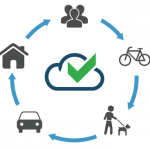 It’s hard to dispute the splash the sharing economy has made over the past few years, with a number of disruptive entrants into a range of markets causing both pleasure and pain. Whilst there have no doubt been many positive aspects of the sharing economy, we have also seen concerns raised, be they New York officials regarding AirBnB or taxi drivers worldwide and their protest against Uber.
It’s hard to dispute the splash the sharing economy has made over the past few years, with a number of disruptive entrants into a range of markets causing both pleasure and pain. Whilst there have no doubt been many positive aspects of the sharing economy, we have also seen concerns raised, be they New York officials regarding AirBnB or taxi drivers worldwide and their protest against Uber.
It’s perhaps not surprising therefore that attempts have been made to better understand this new approach to business, and the impact its having on society. Altimeter led the way with their exploration of the sharing economy in 2013.
This was followed earlier this year by Sharing is the new Buying, which set out to discover just who was using the sharing economy, and how big this market actually was. It emerged that over 25% of the population was now regularly using sharing platforms, be that AirBnB or Kickstarter, eLance or TaskRabbit. The report went on to predict that this participation rate is expected to double in the next year.
Given the disruptive nature of the movement however, it’s perhaps not surprising that the various sides of the debate have begun to guild their lobbying loins. In response to the various responses to the industry from around the world, the Peers.org lobbying group was formed to represent the sharing economy companies.
They launched with 22 founder members and aimed to support the sharing industry in three main ways:
- Mainstream the sharing economy By raising the profile and visibility of sharing
- Protect the sharing economy Through policy campaigns for smart regulation
- Grow the sharing economy By discovering, joining and using new peer and sharing services
Where does this leave government?
You’ll notice that conspicuous by its absence from these explorations is the state itself. It’s interesting therefore to see the launch of a new investigation into the sharing economy by the UK’s Department of Business, Innovation & Skills.
The report will be an independent review of the sharing economy and its social and economic impact upon the UK economy. The report will be looking at the potential for this burgeoning economy, and will explore how government can ensure that potential is reached.
In the interest of balance, the report also aims to uncover some of the risks involved, whether that’s to consumers or incumbent businesses.
The first part of the study will a survey whereby people are asked to submit their views of the sharing economy. The survey wants to hear both from end users of the sharing economy, but also from businesses whose operation has been disrupted by the new entrants.
The survey part of the study is open until the 11th November, so visit the link above to contribute your perspectives. You can find out more about the review via the video below.
Interesting that they're staying largely impartial. I'd have thought the lobbyists would have gotten to them and painted this whole thing as a massive threat to this, that and the other.
Yes, I'm quite surprised to be honest. Pleasantly so.